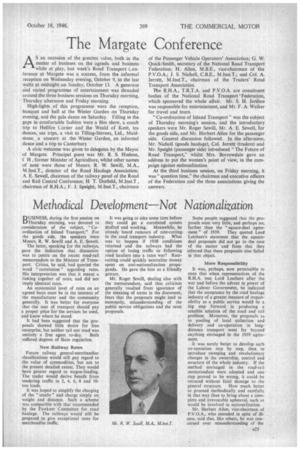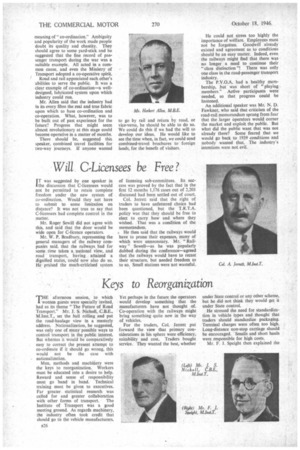Methodical Development Not Nationalization
Page 31

Page 32

If you've noticed an error in this article please click here to report it so we can fix it.
BUSINESS, during the first session on Thursday morning, was devoted to consideration of the subject, "Coordination of Inland Transport." For the goods side, the speakers were Messrs. R. W. Sewill and A. E. Sewell.
The latter, speaking for the railways, gave the indication that discussion was to centre on the recent road-rail memorandum to the Minister of Transport. Critics, he said, had queried the word " correlation " regarding rates. His interpretation was that it meant a linking together of rates, and did not imply identical rates.
An economical level of rates on an agreed basis must be in the interests of the manufacturer and the community generally. It was better for everyone that -the user of transport should pay a proper price for the services he used, and know where he stood.
It had been suggested that the proposals showed little desire for free enterprise, but neither rail nor road was entirely a free agent to-day. Both suffered degrees of State regulation.
New. Railway Rates Future railway general-merchandise classifications would still pay regard to the value of commodities, but not to the present detailed extent. They would have greater regard to wagon-loading. The trader would derive benefit from tendering traffic in 2, 4, 6, 8 and 10ton loads.
It was hoped to simplify the charging of the "smalls" and charge simply on weight and distance. Such a scheme was compatible with that recommended by the Fawkner Committee for road haulage. The railways would still be prepared to give exceptional rates for merchandise traffic. It was going to take some time before they could get a correlated system drafted and working. Meanwhile, he already heard rumours of rate-cutting in the road transport industry. What was to happen if 1938 conditions returned and the railways had the option of losing traffic or following road hauliers into a rates war? Ratecutting could quickly neutralize money spent on anti-nationalization propaganda. He gave the hint as a friendly gesture.
Mr. Roger Sewill, dealing also with the memorandum, said that criticism generally resulted from ignorance of the meaning of terms in the document, fears that the proposals might lead to monopoly, misunderstanding of the public service obligations and the rates proposals. Some people suggested that the proposals went very little, and perhaps no, farther than the " square-deal agreement" of 1939. They quoted Lord Leathers's statement that the squaredeal proposals did not go to the root of the matter and from that they inferred that these proposals also failed in that object.
More Responsibility
It was, perhaps, now permissible to state that when representatives of the R.H.A. met Lord Leathers after the war and before the advent to power of the Labour Government, he indicated that the acceptance by the road haulage industry of a greater measure of responsibility as a public service would be a big step forward in producing a sensible solution of the road and rail problem. Moreover, the proposals as to pooling of local collection and delivery and co-operation in longdistance transport went far beyond anything envisaged in the 1939 agreement.
It was surely better to develop such co-operation step by step, than to introduce sweeping and revolutionary changes in the ownership, control and structure of the whole industry. If the method envisaged in the road-rail memorandum were adopted and one step proved to be wrong, it could be retraced without fatal damage to the general structure. How much better to proceed methodically and carefully in that way than to bring about a complete and irrevocable upheaval, such as would be involved in nationalization.
Mr. Herbert Allen, vice-chairman of P.V.O.A., who attended in spite of illness, said that, like others, he was concerned over misunderstanding of the
meaning of" co-ordination." Ambiguity and popularity of the work made people doubt its quality and chastity. They should agree to some yard-stick and he suggested that the fine record of passenger transport during the war was a suitable example. All acted in a common cause. and even the Ministry of Transport adopted a co-operative spirit Road and rail appreciated each other's abilities to serve the public. It was a clear example of co-ordination—a welldesigned, lubricated system upon which industry could run.
Mr. Allen said that the industry had in its every fibre the real and true fabric upon which to base co-ordination and co-operation. What, however, was to be built out of past experience for the future? Progress that might seem almost revolutionary at this stage could become operative in a matter of months.
There should be, suggested this speaker, combined travel facilities for two-way journeys. If anyone wanted to go by rail and return by road, or vice-versa, he should be able to do so. We could do this if we had the will to develop our ideas. He would like to see the time when, in fact, we could send combined-travel brochures to foreign lands, for the benefit of visitors. He could not stress too highly the importance of welfare. Employees must not be forgotten. Goodwill already existed and agreement as to conditions should be an easy matter. Indeed, even the railways might find that there was no longer a need to continue their "class distinction "! There was only one class in the road-passenger transport industry.
The P.V.O.A. had a healthy membership, but was short of "playing members" Active participants were needed, so that progress could be hastened.
An additional speaker was Mr. N. D. Fawkner, who said that criticism of the road-rail memorandum sprang from fear that the larger operators would corner the market and exploit the public. But what did the public want that was not already there? Some feared that we would go back to 1939 conditions and nobody wanted that. The industry's intentions were not evil.












































































